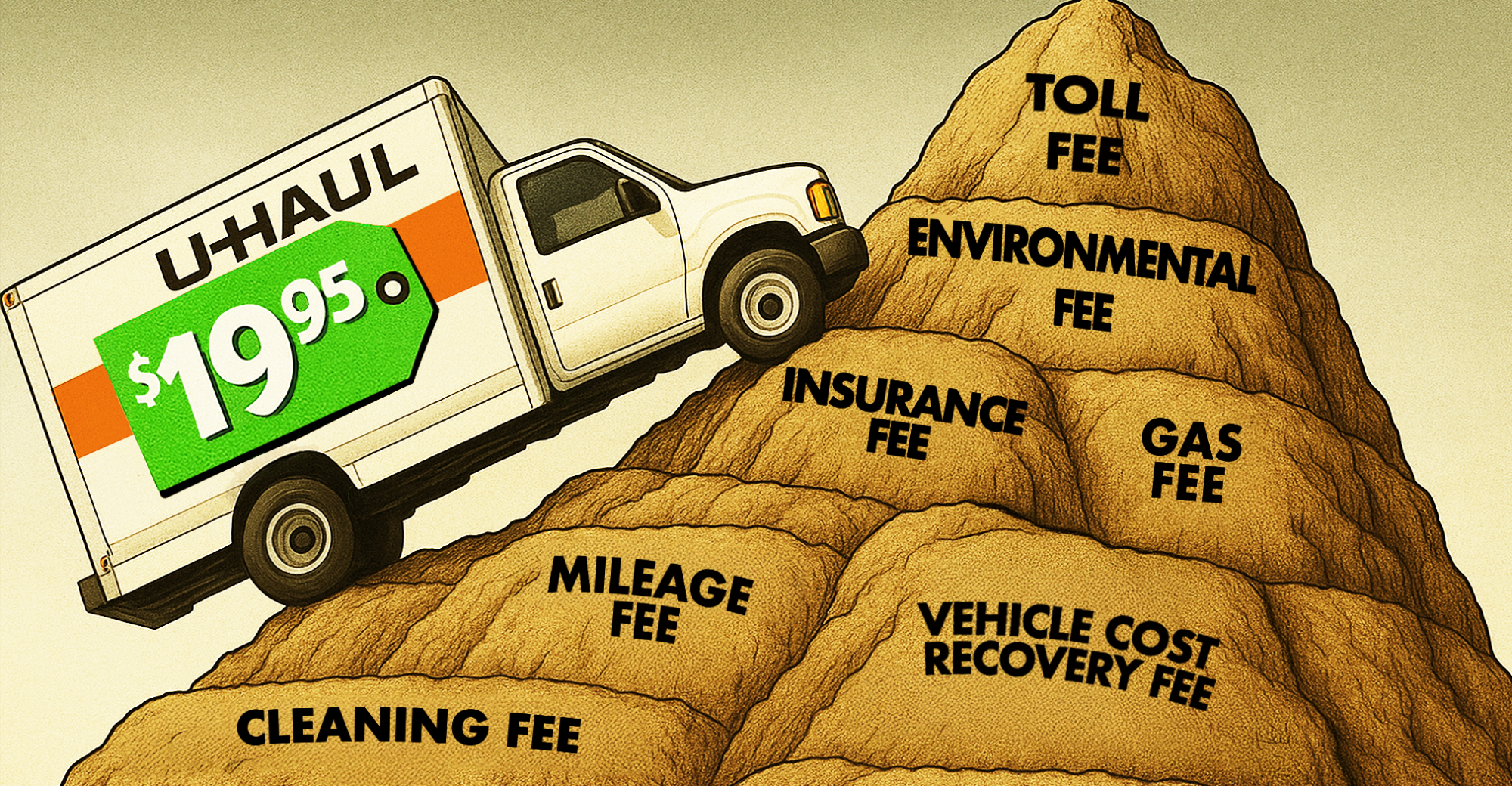
U-Haul Taking a Bite Out of the Big Apple
TINA.org files complaint with NYC over company’s “$19.95” truck rentals.
TINA.org files complaint against home cleaning platform with FTC, states.
|
Many of us lead busy lives. It’s easy for the dishes or laundry to pile up. Maybe we’d like to hire a house cleaner but the average cost of doing so – estimated around $230 – is too much.
Enter Homeaglow.
Advertised as “the most affordable cleaning on the market,” Homeaglow claims in TV commercials like the one above and in various search, social media, print and other ads that it will clean your house for only $19.
But as TINA.org first alerted consumers more than a year ago, consumers should expect to pay a lot more than $19 for a house cleaning booked on Homeaglow.
Since publishing our initial ad alert in July 2024, TINA.org has continued to keep close tabs on Homeaglow. And our dirty work has revealed that the company, despite warnings and actions by TINA.org and others, continues to hide the terms of its $19 cleaning offer, including that by signing up for the offer, consumers are automatically enrolled in an autorenewing monthly subscription that is difficult – and expensive – to cancel.
On Monday, TINA.org filed a complaint with the FTC urging the agency to investigate Homeaglow and take appropriate enforcement action. TINA.org also sent complaint letters to 12 states and the District of Columbia regarding Homeaglow’s multifaceted deceptive advertising scheme.
The details of our complaint are explained below. But first, a little background on this company TINA.org has been investigating for more than a year.
Homeaglow, which operates under various names – including Dazzling Cleaning, Cozy Maid, Bubble Cleaning, AT Maid and Dapper Maids – was founded in 2015 by Aaron Cheung and Xiao Wei Chen after their previous home cleaning startup, Homejoy, failed. The company is part of a home cleaning services industry that is projected to surpass $145 billion in revenue by 2030.
Despite what the ads may lead you to believe, Homeaglow doesn’t directly employ any cleaners. Rather, it claims to help cleaners find work and consumers find cleaners. According to Cheung, Homeaglow connects “close to a hundred thousand households with local home service professionals” and operates in 85% of U.S. ZIP codes, serving “more than one customer per minute.”
If you’re familiar with Homeaglow’s $19 cleaning ads, you’re not alone. The company spends seven figures a month on advertising and has already spent more than $20 million on TV ads alone this year, according to data from Media Radar.
But it’s not just TINA.org that has called the company out for deceptive marketing.
Last year, in response to “numerous consumer complaints, some of which were filed by consumers older than 60 years of age,” Pennsylvania filed an enforcement action against Homeaglow over its marketing of discounted home cleaning services that require enrollment in the company’s monthly subscription plan. To settle the Pennsylvania action, Homeaglow agreed to pay $30,000, as well as to clearly and conspicuously disclose the material terms of its membership on its website and in its ads, and allow consumers to cancel their subscriptions with the same method used to enroll. TINA.org has notified Pennsylvania that Homeaglow is in violation of this court filing.
Homeaglow has also been the subject of several private lawsuits, including a 2023 California class action alleging the company fails to disclose that consumers who book discounted cleanings will be charged monthly membership fees that automatically renew and illegally charging consumers who cancel these memberships early termination fees. The lawsuit is pending.
Consumers are also fed up. Nearly 3,000 consumer complaints have been filed with the FTC concerning Homeaglow. State consumer protection agencies, TINA.org and numerous third-party review sites, including the BBB, have also received complaints about the company. In fact, the number of BBB complaints regarding Homeaglow is so high (more than 2,600 complaints in the last three years) that the BBB has issued three alerts about Homeaglow and gives the company an F rating.
When consumers attempt to sign up for a $19 home cleaning on Homeaglow’s website, they are repeatedly told that what they are signing up for is a discount voucher for “3 hours of cleaning,” which Homeaglow recommends for a one-bedroom, one-bathroom home.
But that’s not all they’re “getting,” to use the parlance of the website. They’re also getting a ForeverClean membership that – true to its name – automatically renews every month until and unless consumers cancel. And while the membership costs $49-$59 a month, it doesn’t include the cost of future cleanings. To add insult to injury, there’s also an “early termination fee” for canceling before six months.
As the below video demonstrates, these membership terms are not adequately disclosed in Homeaglow’s ads or during the checkout process, and therefore are easy to misunderstand or miss completely.
As the video also shows, consumers are led to believe that time is working against them as Homeaglow uses a number of deceptive tactics to speed them through the checkout process. For example:
These deceptive tactics have lured a multitude of consumers to sign up for a Homeaglow cleaning without realizing what they were actually signing up for – an expensive, recurring subscription that autorenews every month and which does not provide them any additional services. (More on consumer complaints below.)
Homeaglow states in its terms and conditions that the “early termination fee” for canceling your ForeverClean membership before six months is “the difference between the full price of your first cleaning at standard rates and the discounted price of your first cleaning.” (During the checkout process – for those discerning enough to spot the disclosures – Homeaglow similarly states that canceling before six months “will result in your first cleaning being charged at full price.”)
On its “Deal” page, Homeaglow represents that the full price of the discounted $19 three-hour cleaning is $75. So it would appear that the penalty for canceling “early” is $56 ($75 minus $19). But the math doesn’t seem that simple – or accurate.
Late in the checkout process, after consumers are asked to enter their credit card information, Homeaglow presents a complicated formula for determining “the full price of your first cleaning,” via a link under the heading “From our legal team.”
Given that the advertised $19 equals three hours of cleaning (for a first-time cleaning), the early termination fee, according to this pop-up, is much higher than $56, even without knowing the cleaner’s hourly rate, which varies. And Homeaglow also sneaks in two junk fees – a platform fee and a transaction fee.
For years, thousands of consumers across the country have lodged complaints with the FTC, TINA.org and numerous third-party review sites regarding their negative experiences with Homeaglow, including, among other things:
A sampling of consumer complaints follows.
The negative reviews regarding Homeaglow on third-party review sites have resulted in a number of poor customer ratings for the company. As of early September 2025, Homeaglow had an average customer review rating of just over one star on the BBB and Sitejabber, while Yelp users rated the company 2.7 stars.
But there is one third-party review site where Homeaglow has a stellar reputation – Trustpilot, where the company is currently rated an “excellent” 4.3 stars (despite Homeaglow advertising early in the checkout process that it has a five-star rating on Trustpilot).
However, following a TINA.org inquiry, Trustpilot recently investigated Homeaglow’s profile and said it found that “30% of all reviews posted in the last six months are fabricated,” prompting it to send the company a cease-and-desist letter on Aug. 28. Now, Trustpilot says it is looking at reviews going back more than six months. (Stay tuned for further updates.)
UPDATE 9/23/25: Homeaglow’s Trustpilot rating has now plummeted more than 3 stars – from 4.5 stars to 1.3 stars – since TINA.org started communicating with the review site in August. In addition, the number of reviews listed on the company’s Trustpilot profile has gone from more than 11,000 to fewer than 1,800.
On top of all the issues outlined above, Homeaglow lures in people looking for well-paying jobs with claims that they can earn $1,000 per week, make more money than in a retail job and even achieve “financial freedom,” among other things, as a cleaner on Homeaglow.
However, many of the company’s earnings claims do not match the reality for typical house cleaners, including those who work on Homeaglow.
According to the U.S. Bureau of Labor Statistics, the median salary for house cleaners in the United States is $33,450, which breaks down to about $600 a week (before taxes or other deductions are taken out) and which is slightly less than the median salary for retail workers. Further, third-party sources report that the median annual salary for a house cleaner on Homeaglow is similar, at $34,000 a year.
And it’s tough to obtain “financial freedom” when Homeaglow doesn’t pay you for your work, as numerous consumers who have signed up as cleaners have accused the company of doing over the years.
“I signed up to do this cleaning work in exchange for pay,” wrote one consumer to the FTC in August 2022. “I worked very hard and the company never paid me. It has been months and I still haven’t been paid. I’m owed over $200.” Another Homeaglow cleaner complained to the BBB in July 2025 that delays in getting paid were affecting their “financial stability.”
In response to a request for comment regarding TINA.org’s investigation and complaint to regulators, the company said in a statement:
Homeaglow strongly disputes the allegations set forth in TINA’s correspondence, and denies that its marketing practices violated the FTC Act, the Restore Online Shoppers’ Confidence Act, or any other law.
The company added, “We are committed to transparency and are always working to improve our product for both our customers and the independent cleaning professionals who utilize our platform.”
In short, Homeaglow’s failure to clearly and conspicuously disclose all the material terms and conditions of its ForeverClean membership before obtaining consumers’ billing information, in addition to its efforts to prevent consumers from canceling as reported by users, constitute clear violations of the Restore Online Shoppers’ Confidence Act and FTC law. Add to this the company’s fabrication of reviews (which violates the FTC’s fake reviews rule) and its use of deceptive income claims, and it’s clear the FTC must take action to send a message that there’s a price to pay for playing dirty.
Find more of our coverage on subscriptions
TINA.org files complaint with NYC over company’s “$19.95” truck rentals.
MADISON, CONN. Sept. 9, 2025 – An investigation by consumer advocacy organization truthinadvertising.org (TINA.org) has found that Homeaglow is deceptively advertising $19 home cleanings in order to lure consumers into…
MADISON, CONN. May 6, 2025 – U-Haul is engaged in a bait-and-switch pricing scheme with its $19.95 truck rental ads, according to an investigation by consumer advocacy organization truthinadvertising.org (TINA.org).…

